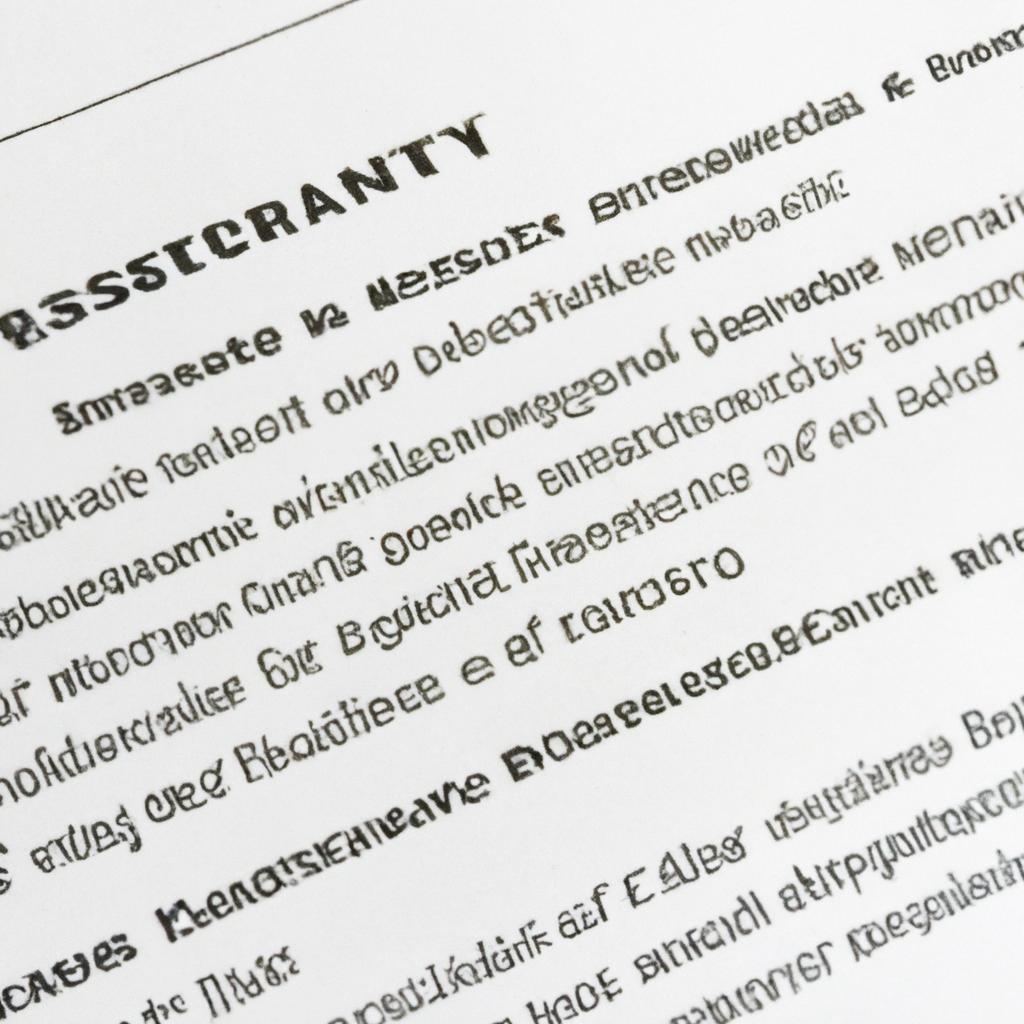In the intricate web of estate planning and administration, one document holds a unique position of authority – the letter of executorship. This crucial legal instrument grants individuals the power to carry out the wishes of a deceased individual, navigating the complex terrain of probate, asset distribution, and legal obligations with precision and integrity. As seasoned lawyers at Morgan Legal Group in the bustling metropolis of New York City, we understand the weighty responsibilities that come with this appointment and provide expert guidance to ensure the seamless execution of your fiduciary duties. Join us as we delve into the significance and intricacies of the letter of executorship, unraveling its importance in the realm of estate planning and beyond.
Understanding the Role of an Executor in Estate Administration
In the process of estate administration, the role of an executor is crucial in ensuring that the wishes outlined in a person’s Will are carried out effectively and efficiently. Acting as the personal representative of the deceased individual, an executor is tasked with managing the estate, distributing assets to beneficiaries, paying off debts and ensuring that all legal requirements are met.
One of the key documents that formalizes the appointment of an executor is the letter of executorship. This document grants the executor the legal authority to act on behalf of the deceased’s estate. It is important for the executor to understand their duties and responsibilities outlined in the letter of executorship, as failure to adhere to these can lead to legal consequences. As experienced estate planning professionals at Morgan Legal Group, we are here to guide you through the process of estate administration and assist you in fulfilling your duties as an executor.

Key Responsibilities and Duties Outlined in a Letter of Executorship
When named as the executor of an estate, it is essential to understand the key responsibilities and duties outlined in the letter of executorship. As the designated individual responsible for overseeing the distribution of assets and settling any outstanding debts of the deceased, there are several important tasks that must be carried out with precision and care.
Some of the key responsibilities and duties typically outlined in a letter of executorship include:
- Locating and securing the deceased person’s assets
- Notifying beneficiaries and heirs of their entitlements
- Managing and distributing the estate according to the terms of the Will
- Filing necessary tax returns for the estate
- Dealing with any outstanding debts or claims against the estate

Navigating Legal Requirements and Best Practices for Executors
In the process of executing a will, one important document that an executor must obtain is the letter of executorship. This document, issued by the probate court, officially appoints the executor to administer the estate of the deceased. The letter of executorship serves as proof of the executor’s authority to act on behalf of the estate and handle matters such as distributing assets, paying debts, and resolving any legal disputes.
When applying for a letter of executorship, it is essential for the executor to follow all legal requirements and best practices to ensure a smooth probate process. Some key steps involved in obtaining a letter of executorship include submitting the will to the probate court, providing proof of the deceased’s death, and completing any required forms or documentation. Additionally, it is crucial for the executor to keep detailed records of all actions taken on behalf of the estate to avoid any potential legal issues.

Ensuring Timely and Efficient Distribution of Assets to Beneficiaries
As the appointed executor of the estate, it is your responsibility to ensure the timely and efficient distribution of assets to the designated beneficiaries. One crucial document that will allow you to carry out your duties effectively is the letter of executorship. This document serves as official recognition of your role as the executor and grants you the authority to administer the estate according to the terms of the will.
With the letter of executorship in hand, you can proceed with the necessary steps to gather, manage, and distribute the assets of the deceased. It is essential to follow the legal requirements and fulfill your fiduciary duties with diligence and care. By keeping accurate records, communicating openly with beneficiaries, and seeking professional advice when needed, you can ensure a smooth and successful distribution process.
Q&A
Q: What is a letter of executorship?
A: A letter of executorship is a legal document issued by a court that grants an individual the authority to act as the executor of a deceased person’s estate.
Q: What does an executor do?
A: An executor is responsible for carrying out the wishes of the deceased as outlined in their will. This includes distributing assets to beneficiaries, paying off debts, and handling any other financial matters related to the estate.
Q: How do you obtain a letter of executorship?
A: To obtain a letter of executorship, you must first be named as the executor in the deceased person’s will. Then, you must file a petition with the court to be officially appointed as the executor.
Q: Can anyone be named as an executor?
A: While technically anyone can be named as an executor, it is generally recommended to choose someone who is trustworthy, organized, and knowledgeable about finances and legal matters.
Q: How long does it take to get a letter of executorship?
A: The process of obtaining a letter of executorship can vary depending on the complexity of the estate and any potential legal challenges. In general, it can take anywhere from a few weeks to several months.
Final Thoughts
In conclusion, the letter of executorship plays a crucial role in the administration of a deceased individual’s estate. Being appointed as an executor is a great responsibility, and it is important to understand the duties and obligations that come with the role. By following the necessary procedures outlined in the letter of executorship, you can ensure that the estate is properly managed and distributed according to the wishes of the deceased. If you have been entrusted with this important task, approach it with diligence and care. Your efforts will not only honor the memory of the deceased, but also provide closure and peace of mind to their loved ones.
 A letter of executorship is a legal document that grants an individual the authority to manage and distribute the assets of a deceased person’s estate. This individual is known as the executor or personal representative of the deceased. The letter of executorship gives the executor the right to carry out the wishes of the deceased as stated in their will.
A letter of executorship is a legal document that grants an individual the authority to manage and distribute the assets of a deceased person’s estate. This individual is known as the executor or personal representative of the deceased. The letter of executorship gives the executor the right to carry out the wishes of the deceased as stated in their will.
Obtaining a letter of executorship is an important step in the probate process and is necessary for the executor to have legal authority to manage the assets of the deceased. In this article, we will dive into everything you need to know about a letter of executorship, its benefits, and how to obtain one.
What is a Letter of Executorship?
A letter of executorship is a document issued by the Probate Court or the Surrogate’s Court that grants an individual the legal authority to manage and distribute the assets of a deceased person’s estate. It is also known as a Grant of Probate or Letters Testamentary. This letter is necessary for the executor to carry out their duties and responsibilities as outlined in the deceased person’s will.
The executor is responsible for collecting and managing the assets of the estate, including paying any outstanding debts or taxes and distributing the remaining assets to the beneficiaries as stated in the will. Without a letter of executorship, the executor will not have authority to conduct these tasks.
How to Obtain a Letter of Executorship?
The first step to obtaining a letter of executorship is to file a petition for probate with the Probate Court or the Surrogate’s Court. This process involves submitting the original will and any other necessary documents, such as death certificate and inventory of assets, to the court.
Once the petition is reviewed and approved by the court, the executor will be issued a letter of executorship, giving them the legal authority to manage the estate. The process may vary slightly depending on the state where the deceased person resided, so it is important to consult an attorney or court clerk for specific instructions.
Benefits of a Letter of Executorship
1. Legal authority to manage and distribute assets.
The most significant benefit of a letter of executorship is the legal authority it grants to the executor to manage and distribute the assets of the estate. This ensures that the deceased’s wishes are carried out as stated in their will and protects the beneficiaries from fraudulent activities.
2. Reduces conflicts between beneficiaries.
Having a letter of executorship can significantly reduce conflicts between beneficiaries. With a designated executor in charge, all decisions regarding the estate will be made by one individual, minimizing the potential for disputes among the beneficiaries.
3. Simplifies the probate process.
The probate process can be complex and time-consuming, but having a letter of executorship can simplify the process. The executor is responsible for handling all legal matters concerning the estate, including paying debts, filing taxes, and distributing assets. This relieves the burden from the beneficiaries, allowing them to grieve and focus on their personal matters.
Tips for Executors
1. Keep accurate records.
As an executor, one of your main responsibilities is to keep accurate records of all financial transactions and communication with beneficiaries. These records will be necessary to provide to the court and beneficiaries during the probate process. It is important to stay organized and keep all documents in a safe place.
2. Seek professional advice.
Handling the probate process can be overwhelming and complex, especially if you have no prior experience. It is always beneficial to seek professional advice from an attorney or an accountant to ensure all tasks are carried out correctly and in a timely manner.
3. Communicate with beneficiaries.
Communication is key in any executorship process. Keeping beneficiaries informed about the status of the estate can help prevent conflicts and ensure transparency in the distribution of assets. It is also important to communicate with them in a timely manner and provide any necessary updates.
Case Studies
To further understand the importance of a letter of executorship, here are two case studies:
1. Conflict avoidance.
John appointed his oldest son as his executor and listed all five of his children as beneficiaries in his will. However, John’s oldest son fell ill and was unable to fulfill his executor duties. Without a letter of executorship, the remaining four siblings were unable to agree on how to distribute the estate, leading to a lengthy and expensive court battle.
2. Smooth probate process.
Samantha was appointed as the executor of her aunt’s estate. With a letter of executorship, Samantha was able to easily collect and manage the assets, pay any outstanding debts, and distribute the remaining assets to her aunt’s designated beneficiaries. The probate process was completed within a few months, and the beneficiaries were able to receive their inheritance without any conflicts.
Conclusion
A letter of executorship is a crucial document that serves as proof of legal authority for an executor to manage and distribute the assets of an estate. It is a necessary step in the probate process and provides many benefits, such as preventing conflicts between beneficiaries and simplifying the process.
Obtaining a letter of executorship can be a complex and time-consuming process, but with proper knowledge and guidance, the executor can fulfill their duties with ease. If you have been appointed as an executor, it is essential to understand your responsibilities and seek professional advice when needed. This will ensure the deceased’s wishes are carried out accurately and efficiently.


